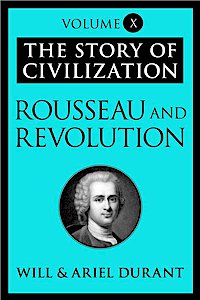

Tao Te Ching

Rousseau and Revolution
The Durants—recognizing him as the major sage of his era, patron saint of the French Revolution, and a major influence on many cultural and political trends that continue today—used Rousseau as a counter-symbol to Voltaire for the time period in Europe between 1715 to 1789. Voltaire's life roughly spans this same period of time and the Durants describe his life and influence in their previous volume, The Age of Voltaire. The counter-points are the reason and rationality of Voltaire, the romanticism, passion, and creativity represented by Rousseau.
Quotes from Rousseau and Revolution
“a man born poor, losing his mother at birth and soon deserted by his father, afflicted with a painful and humiliating disease, repudiated by society and civilization... driven from place to place as a dangerous rebel, suspected of crime and insanity—how did it come about that this man, after his death, triumphed over Voltaire, revived religion, transformed education, inspired the Romantic movement and the French Revolution... had more effect upon posterity than any other writer or thinker of that 18th century?... after his voice was stilled, all Europe listened to him.”
Chapters:
Comments: Click to comment
“All in all, The Decline and Fall of the Roman Empire may be ranked as the supreme book of the 18th century. It was not the most influential but as a work of literary art it was unsurpassed in its time or kind.”
Chapters:
Comments: Click to comment
“As in science, so in philosophy he was a lover, not a professor... he was endlessly concerned with the interpretation of nature and the meaning of life. As he became older, he grew through science and poetry into a sage. He found illumination about the whole from every object, moment, and part”
Chapters:
Comments: Click to comment
“Europe was ready for a gospel that would exalt feeling above thought. It was tired of the restraints of customs, conventions, manners, and laws. It had heard enough of reason, argument, and philosophy; all this riot of unmoored minds seemed to have left the world devoid of meaning, the soul empty of imagination and hope”
Chapters:
Comments: Click to comment
“Faust, in Part I, is individualism incarnate; in Part II he finds 'salvation,' health of soul, through working for the general good... [Goethe] as he matured through political office perceived that human life is a co-operative process; that the individual survives by mutual aid, and that self-seeking actions, though still the basic force, must be limited by the needs of the group.”
Chapters:
Comments: Click to comment
“Gibbon's style is as luminous as irony would allow, and it shed light wherever it turned, except where prejudice darkened his view... His scholarship was immense and detailed. His footnotes are a treasury of learning lightened with wit... Child of the Enlightenment, Gibbon longed to be a philosopher”
Chapters:
Comments: Click to comment
“It is the obligation of the old to serve as a brake upon the energy of the young”
Chapters:
Comments: Click to comment
“Venerable patriarch of French letters, the glory of France, defender of a hundred victims of intolerant creeds and unjust laws; Voltaire's crowning and redeeming virtue was his humanity. He stirred the conscience of Europe, he denounced war as 'the great illusion.' He could be irascible and break out in a temper; but, did his virtues outweigh his vices? Yes, and even if we do not place in the scale his intellectual with his moral qualities. Against his parsimony we must place his generosity, against his love of money his cheerful acceptance of losses and his readiness to share his gains.”
Chapters:
Comments: Click to comment
“We know that a lifetime is but a moment in history, and that the historian's best is soon washed away as the stream of knowledge grows. But we confirmed our belief that historiography has been too departmentalized, and that some of us should try to write history whole as it was lived, in all the facets of the complex and continuing drama.”
Chapters:
Comments: Click to comment
Comments (0)